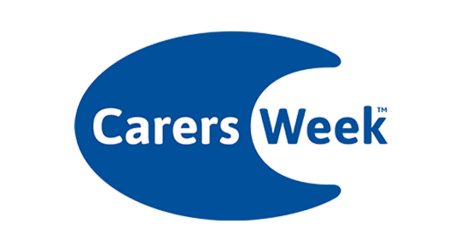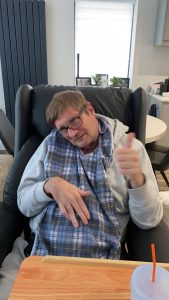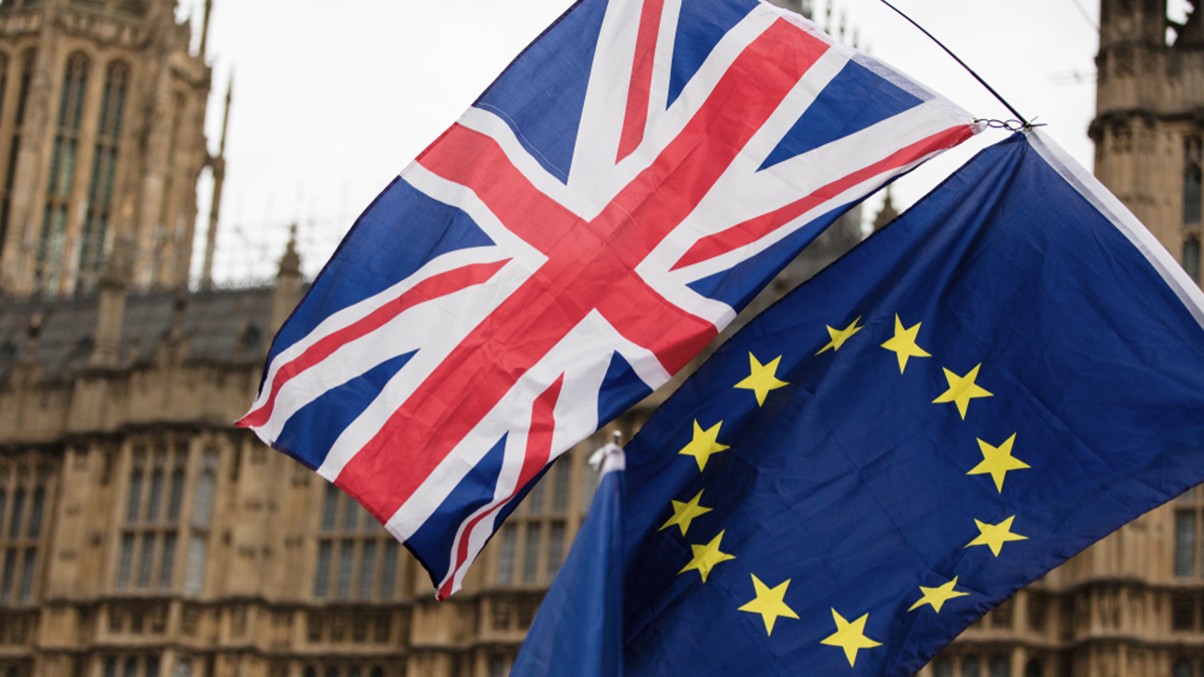Carers Week is an annual campaign to raise awareness of the work done by carers and the sacrifices they make to help people, and to offer support for people with caring responsibilities. This year’s theme for Carers Week is ‘Caring About Equality’, defined by Carers UK as “highlighting the disparities and disadvantages faced by unpaid carers across the UK and calling for a fairer society where they have access to greater support”.
To mark Carers Week 2025, Scott Rigby and James Griffin from our International Injury team share their insights and the stories of three carers who do brilliant unpaid work for family members with serious injuries.
Responsibilities of carers
Carers make countless selfless sacrifices to support those in need. They may prioritise the needs of others over their own, impacting their social life, career and personal well-being. These sacrifices can range from managing practical needs like meals and transportation to providing emotional support and companionship. Carers often dedicate significant time to caregiving, neglecting their own hobbies and social activities.
Some caregivers may deplete personal savings, dip into loans, or even work extra shifts to cover the costs of care. Carers may also need to take time off work or quit their jobs to provide care, potentially impacting their financial stability and long-term career progression.
The demanding nature of caregiving can lead to physical exhaustion and emotional distress, impacting the carer’s own well-being. Carers may need to adjust or cancel personal plans to attend appointments, manage emergencies or provide care for loved ones.
These sacrifices are often made out of love and a desire to support those in need, but they can have a significant impact on the carer’s life and wellbeing. Recognising and acknowledging the sacrifices of carers is only right and can go some way to making them feel like they in turn have support available.
Rola Azizeh
A short while after her son, Joseph, arrived in the UK for his education, Rola received the devastating news that he had been hit by a car and had sustained a severe and potentially non-survivable brain injury. After she took the phone call, Rola didn’t think twice. She packed her bag to be at Joseph’s bedside. She has been by his side ever since, moving her entire family to England and giving up their family home and business to support Joseph through his journey following his brain injury.
Rola’s devotion to her family was recognised when she received the Carer of the Year Award at Headway’s Annual Awards Ceremony in December 2024.
Joseph’s case manager, Lucinda Ongey Dellar, Clinical Director and Lead Case Manager at LOD Care and Case Management Ltd and one of the UK’s leading brain injury case managers said:
“I have rarely met an individual so inspiring and dedicated to doing the best for not only her son, but her other children who became resident in the UK to support their brother to achieve his rehabilitation potential. I have learnt so much from Rola, both as a professional and as an individual. My life and the lives of those around me are better for having had the privilege of being able to work alongside her and her family.”
Joseph’s barrister, William Latimer-Sayer KC of Cloisters Chambers, remarked:
“Rola is an absolute inspiration. She has been a shining beacon of light for her son through very dark and difficult times. Although humble and under-stated, she is an absolute powerhouse fighting to ensure that her profoundly injured son’s opportunities to live as full a life as possible are maximised.
“I’ve been a barrister specialising in personal law for nearly 30 years and I cannot think of a carer who is more deserving of the award than Rola. Her loyalty and devotion to meeting her son’s needs is truly exceptional. There is no doubt that Joseph’s significant improvement, his ability to return to previous activities and to have some quality of life is due in large measure to Rola’s perseverance in the face of adversity and constant daily challenges.”
Simon’s mum
Simon, a 14-year-old boy, was riding his bicycle when he was involved in a road traffic collision and sustained a constellation of injuries including a concussive brain injury and post-concussion syndrome leading to cognitive, physical and behavioural impairments. As a result, Simon has experienced a change in personality, at times becoming angry and aggressive. Five years later he is only just beginning to recover from the psychological distress. He has been hospitalised after having self-harmed and developed suicidal ideation.
The collision had a devasting effect on Simon’s life, including his education and friendships; and the lives of his parents, who have provided unstinting and devoted support and temporarily relocated in order that Simon could continue his education, while also having to cope with the demands of full-time jobs.
Reflecting on their new life, post-injury, Simon’s mum remarked:
“We’ve never really thought of ourselves as carers. We’ve just been doing what any parent would do for their child, just for longer and in a different way than we ever expected. It’s been exhausting. We are mentally shattered. It’s easier not to go out than to do so and pretend everything is fine. We’ll be putting on a smile or ignoring unintended comments. Work is a welcome distraction. It’s been hard for our other son too, who lost a friend and companion.
I never realised how true the saying “you are only as happy as your unhappiest child” was. When Simon let me hug him again after years of him not letting anyone touch him, it was the happiest I had been for a long time.”
Caroline Dracup
On Christmas Day 2019, Charles Dracup travelled for what was meant to be a once-in-a-lifetime holiday touring South Africa with his wife Caroline, his two adult children and his brother-in-law’s family. At the Kololo Game Reserve, Charles fell over the guardrail of the balcony to the concrete ground below. It is alleged in the subsequent High Court proceedings that the height of the guardrail on the balcony was well below waist height for an average adult and lower than prescribed by South African National Building Regulations. 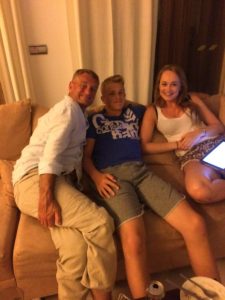
Charles sustained a severe brain injury in the fall. He is now a wheelchair user, lives in specially adapted accommodation and requires 24-hour care from his wife Caroline, who is his sole carer. Charles previously had access to NHS CCG funding, which allowed Caroline to hire two care assistants to visit Charles throughout the day and assist with his care. This funding was removed in 2023.
Caroline describes her caring responsibilities on a typical day:
“I wake up at 7am. Charles and I now sleep in separate rooms, in separate beds. Charles has a hospital profiling bed. I have a monitor set up in his room, so I can see and hear him. I usually wake him up at around 8am. Charles sleeps with a continence pad at night. I change his pad after waking him up.
Charles is able to feed himself with a spoon using his left hand. However, I must watch him when eating or drinking, to ensure he does not attempt to swallow too much at a time. This is something he is prone to do if not prompted. When eating anything else, I ensure that the foods are cut up for him in advance. He is not able to use a knife to cut food himself and cannot manage anything which requires significant chewing, such as an apple.
Transferring Charles in and out his wheelchair is done by me alone, as I have no one else. However, all previous carer risk assessments suggest that transfers should be done by two people. Whenever they attended, the carers would always double up during transfers.
Charles can remain sitting up on the edge of the bed independently. However, he cannot get up from laying down to sitting up independently. He really pulls on me to help himself sit up. I have a sara-steady to assist in his transfer.
Charles knows and can recognise all his family and friends. However, he is unable to say what day or year it is. His short-term memory has gone, so he cannot tell me what we did the previous day. He often watches sport on the television, and is an avid cricket fan, but he often cannot recognise which team is playing. He can read some text, and if you pass him a newspaper, he will automatically turn it over to the back pages to look at the sport headlines, but if asked about it he cannot process or recall what he has seen.
His speech is legible, and he does not slur his words. However, he will not engage in conversation, and only replies when spoken to. He cannot follow conversation, so it is difficult. By late afternoon, he will often start asking questions as if it was years ago, such as whether he needs to pick up our son, and querying how his business is doing.
He has twice fallen out of bed in the past three years. On an occasion he has fallen out of bed, I have not been able to physically lift him. I have had to call a friend in the middle of the night to help me. 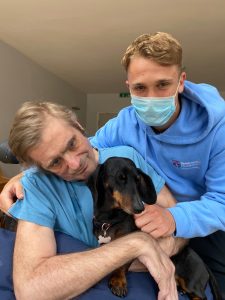
On Fridays, from around 10.30am to 4pm, Charles attends a day centre of people who have sustained a brain injury. This is the only respite I receive all week. It is hard.”
The Dracup family is still waiting for a trial date to be listed by the South African courts nearly two and a half years after the commencement of proceedings. To date, the Kololo Game Reserve has not provided any funding to assist with Mr Dracup’s extensive care requirements.
Concluding thoughts
Scott Rigby says: “As a solicitor who has represented those who have sustained life-changing injuries for over 20 years, I am constantly in awe of the family members and friends who support my clients and who make incredible sacrifices to care for their loved ones. They don’t seek recognition or payment, they simply do it out of love and a desire to make their loved one’s life better.”
You can find further information regarding our expertise, experience and team on our International Injury page.
If you require assistance from our team, please contact us.
Subscribe – In order to receive our news straight to your inbox, subscribe here. Our newsletters are sent no more than once a month.

